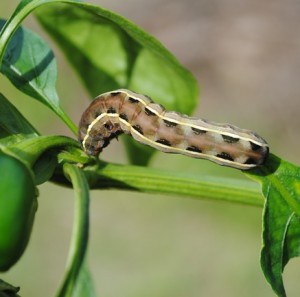Yellowstriped armyworms, Spodoptera ornithogalli, have made an appearance in Wakulla County, Florida. While common in the eastern United States, and even as far west as the Rocky Mountains, as a pest its occurrence is limited primarily to the southeastern states.
The larvae damage plants by consumption of foliage. Yellowstriped armyworms typically skeletonize foliage but, as the larvae grow and disperse, they consume irregular patches of foliage or entire leaves.
These species are general feeders, capable of damaging many crops. Among vegetable crops injured are asparagus, bean, beet, cabbage, cantaloupe, carrot, corn, cucumber, lettuce, onion, pea, potato, rhubarb, rutabaga, salsify, sweet potato, tomato, turnip, and watermelon.
Other crops damaged include alfalfa, blackberry, cotton, clover, grape, lentil, peach, rape, raspberry, sorghum, soybean, sugarbeet, sweetclover, sunflower, tobacco, wheat, and several flower crops. In many cases, yellowstriped armyworms emerge on weeds or rangeland plants, with subsequent generations affecting crops.
Several wasp parasitoids prey upon this pest, and insecticides are an option for agronomic crops. For additional information on the biology and management of yellowstriped armyworms please read the following UF/IFAS publication. Yellowstriped Armyworm, Spodoptera ornithogalli (Guenee) (Insecta: Lepidoptera: Noctuidae)
- The Federal Reserve’s Beige Book Outlook for the Near Future - August 9, 2019
- Creeping Indigo: Get Ahead of the Problem Now - March 1, 2019
- Horse Hooves Need Extra Care in Wet Pastures - February 15, 2019

